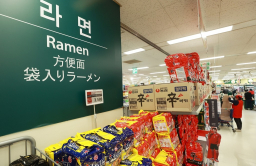-
KOSPI 2812.05 +41.21 +1.49%
-
KOSDAQ 756.23 +6.02 +0.80%
-
KOSPI200 376.54 +6.64 +1.80%
-
USD/KRW 1373 3.00 -0.22%
Nongshim to build instant noodle plant in Korea for exports
Food & Beverage
Nongshim to build instant noodle plant in Korea for exports
The maker of the world-famous Shin Ramyun will ship most of the new factory's products to Europe
By
Mar 22, 2024 (Gmt+09:00)
3
Min read
News+

Nongshim Co., South Korea’s top instant noodle maker, is set to build a new factory in the country for exports of ramen, or ramyun, for the first time in 17 years to meet rapidly growing overseas demand, its chairman said on Friday.
“We are mulling a new ramyun plant dedicated to exports on the existing sites such as Pyeongtaek and Busan as exports are currently healthy,” Nongshim Chairman and Chief Executive Shin Dong-won told reporters after its annual shareholders’ meeting.
The maker of the world-famous Shin Ramyun last established a domestic plant in 2007 in Busan, about 400 kilometers (249 miles) southeast of Seoul. The company is currently operating seven factories in the country, including one in Pyeongtaek, about 80 km southwest of the capital. It has five plants in the US and China, the world's two largest economies.
Nongshim may start the construction of the new plant this year once it quickly completes site reviews, a company official said.
The move came as overseas demand for South Korean instant noodles has been rapidly growing. The country’s ramen exports hit a monthly record high in February on the course to hit the $1 billion mark this year for the first time.
Samyang Foods Co., Nongshim’s smaller local rival, on March 6 broke ground on a factory in the country to produce its global-hit Hot Chicken Flavor Ramen.
SALES UNIT IN EUROPE
Nongshim’s sales rose 9% to a record high of 3.4 trillion won ($2.5 billion), including $1.3 billion from overseas markets. Its operating profit nearly doubled to the largest-ever 212.1 billion won, of which more than half was made in other countries.
Its overseas sales have seen a steady rise, from $800 million in 2019 to $1 billion in 2020, $1.1 billion in 2021 and $1.2 billion in 2022.
The company plans to ship most products manufactured in the new factory to Europe where its revenue more than doubled to $61 million last year from $25 million in 2019.
“We are considering setting up a sales unit in Europe as exports to the region are strong,” Shin said.
Ramen demand in Europe had been weaker than in the Americas and Asia. But European consumers are increasingly interested in South Korean instant noodles, prompting the company known for Chapaguri, a combination of its black soy bean sauce noodle Chapaghetti and the hot spicy noodle Neoguri featured in the Oscar-winning film Parasite to invest in the market.
Meanwhile, Nongshim's plan for a third factory in the US needs more time, Shin said.
“It will take more time to review the plan as construction expenses, including site prices and labor costs, have increased in the US,” he said.
Last year, Shin said the company aimed to break ground on the factory in the Eastern US in 2025.
Nongshim, the No. 2 ramen maker in the US after Japan’s Toyo Suisan Kaisha Ltd., is currently expanding its instant noodle production line at the second factory in Rancho Cucamonga, California.

Nongshim’s US sales more than doubled to $538 million last year from $254 million in 2019.
NO DOMESTIC PRICE HIKES PLANNED
Meanwhile, Shin said the company will consider cutting ramen prices in South Korea as the government has called for lower processed food prices to ease inflation in Asia’s fourth-largest economy.
“We will mull cuts, although it is not easy to adjust ramyun prices only with (costs of) only one ingredient – flour,” he said.
“We have no choice but to decide on consideration of various variables as circumstances are unstable. I can only say that we do not plan to hike ramyun prices this year.”
Write to Hyung-Joo Oh at ohj@hankyung.com
Jongwoo Cheon edited this article.
More To Read
-
Mar 21, 2024 (Gmt+09:00)
-
Mar 06, 2024 (Gmt+09:00)
-
Feb 01, 2024 (Gmt+09:00)
-
Jul 14, 2023 (Gmt+09:00)
-
 Food & BeverageS.Korea urges ramen makers to cut prices to ease inflation
Food & BeverageS.Korea urges ramen makers to cut prices to ease inflationJun 19, 2023 (Gmt+09:00)
-
 Food & BeverageInstant noodle maker Nongshim eyes 3rd plant in US
Food & BeverageInstant noodle maker Nongshim eyes 3rd plant in USMar 24, 2023 (Gmt+09:00)






